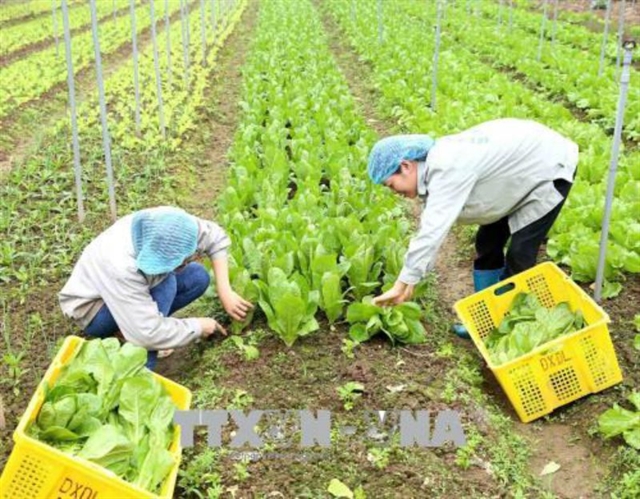 Society
Society


|
| Through international co-operation, many projects on advanced technology in farming activities have been transferred to Hà Nội farmers. — VNA/VNS Photo |
Nguyễn Xuân Đại, deputy director of the Hà Nội Department for Agriculture and Rural Development, talks to Hà Nội Mới (New Hà Nội) newspaper on the city’s achievements in international co-operation in agriculture in the last three years
Can you tell us about some of the city’s international co-operation in agriculture?
Since 2007, the Hà Nội agriculture sector has signed five memorandums of understanding with foreign counterparts, particularly in the field of import-export of agriculture products.
For example, Hà Nội signed a memorandum of understanding with the Japanese Meika Shoji Group; the Malaysian SDN BHD Fresh Farm in the import-export of Canh orange, Diễn pomello, longan and others. Now, Hà Nội has 18 co-operative projects with foreign counterparts in crop cultivation and animal husbandry.
How has Hà Nội benefited from this collaboration?
The city has completed its task of land accumulation to facilitate its agriculture development in accordance with the Hà Nội municipal city authorities’ plan. For example, the city has 15 communes specialised in raising dairy cows; 13 communes specialised in pig rearing and 29 communes in poultry raising, plus more than 4,200 farms.
Through international co-operation, many projects on advanced technology in farming activities have been transferred to Hà Nội farmers. As a result, many of Hà Nội’s agro-products have been exported. For example, in 2018, Hà Nội exported 19 tonnes of longans to the US and some European countries.
In animal husbandry, Hà Nội has carried out the Việt Nam-Belgium Dairy Cow project and received support from Belgium in dairy cow rearing. The city has also co-operated with the Netherlands in a project on pig rearing.
In other words, co-operation projects with foreign partners have helped the Hà Nội agriculture sector gain a high reputation in both the domestic and foreign markets. This is an important motivation for the city’s agriculture sector.
Can you elaborate?
Since 2014, the Hà Nội Department of Agriculture and Rural Development has supported Laos’ Vientiane and Luang Prabang Province to develop their agriculture production. Hà Nội has also completed a project to help Vientiane develop its own plan on agriculture and forestry development. In the meantime, Hà Nội has helped Luang Prabang develop its Nậm Bạc native orange with high yield and quality.
From 2011-2014, Hà Nội also sent agriculture experts to Mozambique to grow rice with high yield on 100ha and to develop three books on rice cultivation techniques.
Does Hà Nội have plans to expand its international agriculture relations?
International co-operation in agriculture is a tendency nowadays as it is an important tool in agricultural restructuring.
To accelerate its international integration, the Hà Nội agriculture sector will continue to work with farmers in restructuring their crop plants and animal husbandry to achieve the target of high economic efficiency. Also, Hà Nội authorities will work side by side with the farmers to help them apply advanced technology to gain higher yields to cater for both the domestic and foreign markets’ demand. VNS.




